THE FLAME SHINING BRIGHT ATOP OF THE L.A. MEMORIAL COLISEUM - For the first time since the 1984 Summer Olympics over 7,000 athletes from 177 countries are at Exposition Park competing in 27 different sports for the Special Olympics World Games. This is an amazing event and Southern California is quite lucky to be hosting such an event. (If you have not had a chance to make it to any events you should go, and most sporting events are free.) Just as these games in Los Angeles are underway with the incredible, inspiring athletes doing what they do best word came way that Boston is withdrawing its bid to host the 2024 Summer Olympics.
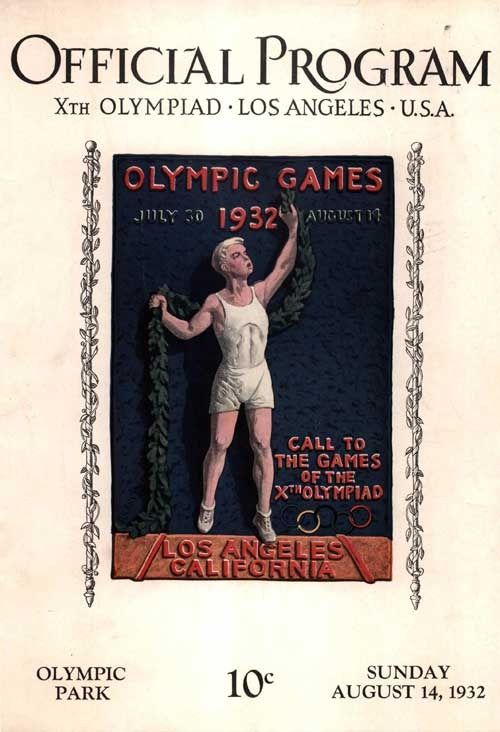
The official program of the 1932 Summer Olympics. Photograph in public domain.
What does this mean? Well, even though there has been no official announcement, yet, L.A. is tip-toeing its way back to bidding on hosting the 2024 Summer Olympics. Of course, at this point in the Olympic bidding game, L.A. still has a very long way to go as they have to compete with not just other cities around the United States, but around the world to win hosting the Summer Olympics.
If L.A. is successful in winning the 2024 games The City of Angels would be the only place in the United States to hold three modern Olympic events.
Before we look forward let us look back to the past to one Summer Olympic event. No, not the 1984 Summer Olympics, which, by the way, is often credited for "saving" the modern Olympics by way of over-the-top opening ceremony pageantry and major corporate sponsorship, but the very first Summer Olympics in 1932, officially known as the Games of the X Olympiad, which opened July 30, 1932.

Opening ceremony of the 1932 Summer Olympics at L.A. Memorial Coliseum. Photograph in public domain.
How Did L.A. Win the Bid For The 1932 Summer Olympics?
As you may know by now these days a city in the world bidding to host the Olympics, be it the summer or winter event, is a major competitive event in and of itself with a lot of wooing and impressing International Olympic Committee (IOC) officials.
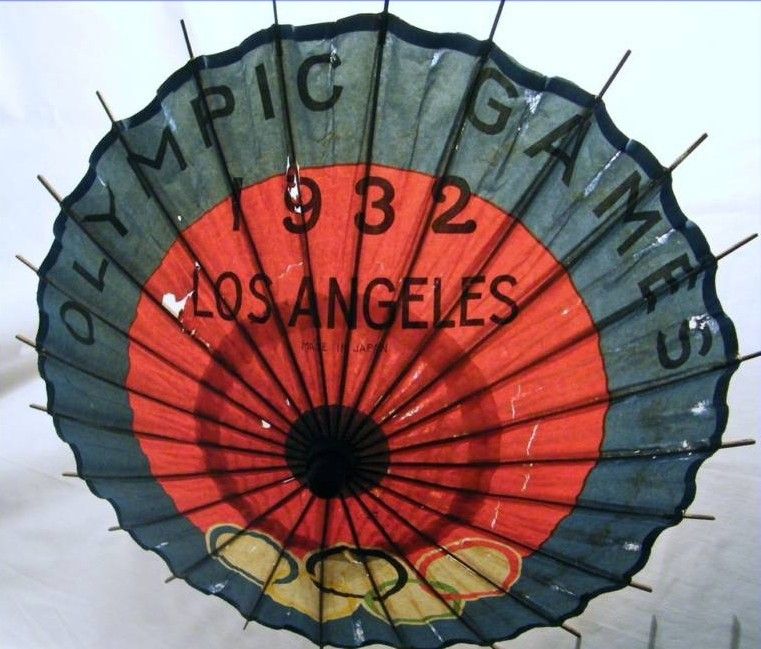
A parasol for those needing some shade from the summer sun while watching the Summer Olympics. Unclear if this is an official Olympic sanctioned item.
Now to bid for the 1932 summer games L.A. did not have a lot of competition in the bidding process to host the Tenth Modern Olympiad. By not having a lot of competition that is to say L.A. had no competition in bidding to host the games, because L.A. was the only city to bid to host the games.
Why Was L.A. The Only City To Bid On Hosting The 1932 Summer Olympics?
Well, then, as it is now, the decision on where to host the Olympics was made many years in advance. The selection was made at the 23rd IOC Session in Rome, Italy, in 1923, and that decision came on the heels of "the wars to end all wars." Many countries were broke and just weary. So, basically, what was Europe's disadvantage in dealing with the depressing aftermath of World War I was L.A.'s advantage.
The Great Depression Put A Damper On The Olympics
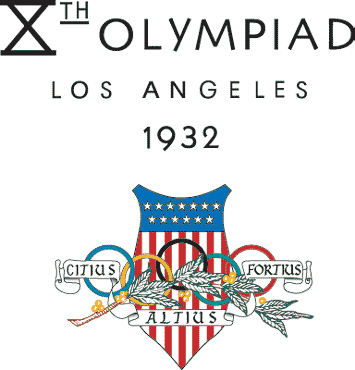
The official 1932 Summer Olympics' logo. Used under public domain.
While the 1920s were a "Roaring" time by the end of that jazz decade the stock market crash of 1929 ushered in the Great Depression. The depression was so bad that many nations and athletes just simply could not afford the trip to L.A. to compete in the 1932 Olympics. In fact, participation in the 1932 games was the lowest since the 1904 Olympics, with only half as many athletes taking part as had in the 1928 Olympics.
Adding To The L.A. Olympics' Woes Was California's Remoteness
Atop of the many problems The Great Depression brought on what further compounded problems with the 1932 Summer Olympics was the difficulty of reaching Southern California. Hard to even imagine today of such a thing, but California was still a remote, somewhat isolated area of the world. Remember, in 1932 the main mode of transportation was passenger railway, which could take several days, and airline travel was still a very exotic thing. Driving your car or taking a bus cross-country could be a harrowing experience.
The President Did Not Even Attend The Opening Ceremony, Or Any Olympic Event
With the many problems plaguing the U.S. and world President Herbert Hoover did not attend the opening ceremony or any Olympic event in L.A. Yes, Mr. Hoover, by this point not a very popular president, skipped this major event held in his country.
Mr. Hoover would be the second U.S. president to miss the Olympics in the United States held during his term behind President Theodore Roosevelt. Mr. Roosevelt refused to attend the 1904 Summer Olympics held in St. Louis, because St. Louis Mayor David R. Francis declined to let Mr. Roosevelt help officiate the games.
Despite Adverse Conditions The Opening Ceremony Broke Records And Set The Standard For Today's Olympic Opening Ceremonies
With The Great Depression, the President of the United States opting not to attend the games and the problems of just simply getting to Southern California you would think these Olympic games would make the record books for being poorly attended and a general lack of caring for the summer games. Glad to report, you would be wrong.
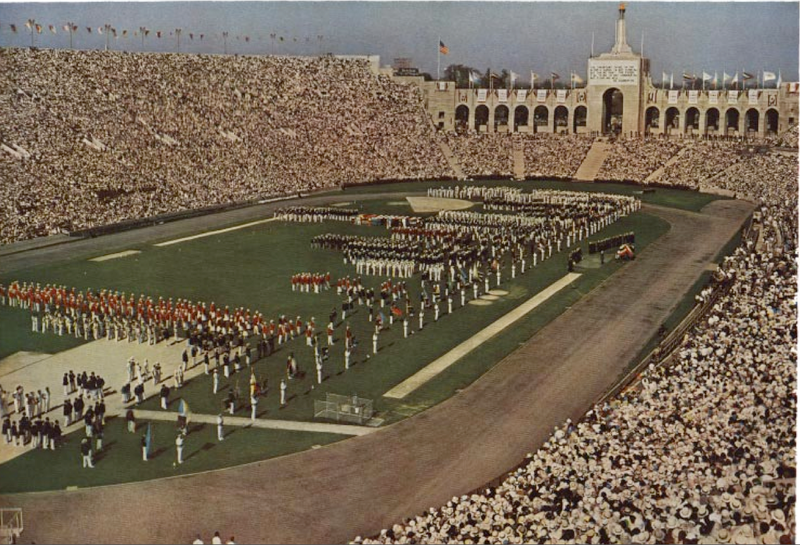
Rare color photograph of the opening ceremony of the 1932 Summer Olympics at L.A. Memorial Coliseum. Photograph in public domain.
Turns out over 100,000 people attended the opening ceremony at the Memorial Coliseum, and, according to the Olympic Movement, "Its scale and quality were beyond anything that had come before, creating the first Games we would recognize today."
Furthermore, the 1932 Summer Olympics, according to Olympic officials, "gave birth to the modern format."
The 1932 Summer Games Gave Birth To The Modern Olympic Village
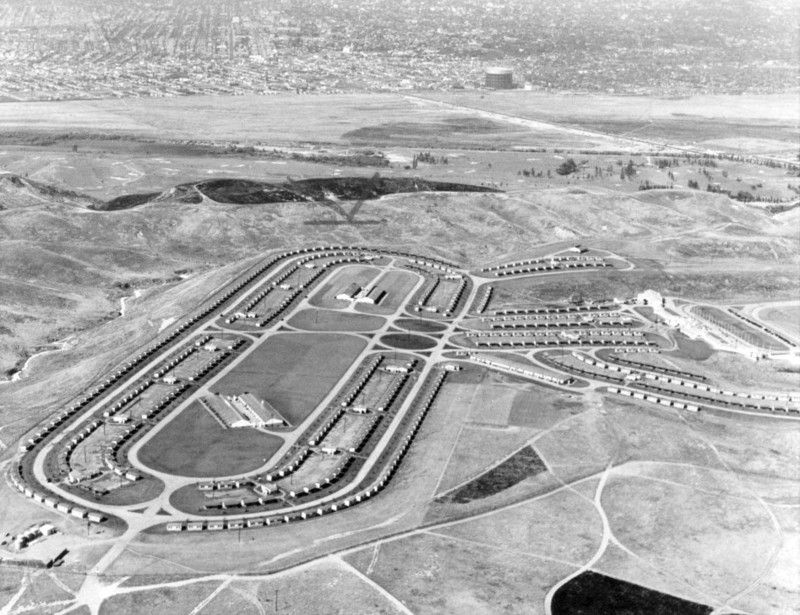
Rare photograph of the first Olympic Village in Baldwin Hills. Photograph in public domain.
Before the 1932 Summer Olympics athletes, their athletic trainers and other Olympic officials basically had to stay at whatever hotel or other housing they could find, and for Olympic officials that ended up being very expensive. That changed in 1932 with the building of the first modern Olympic Village in Baldwin Hills. Now the males stayed in Baldwin Hills while the female athletes were housed at the Chapman Park Hotel on Wilshire Boulevard.
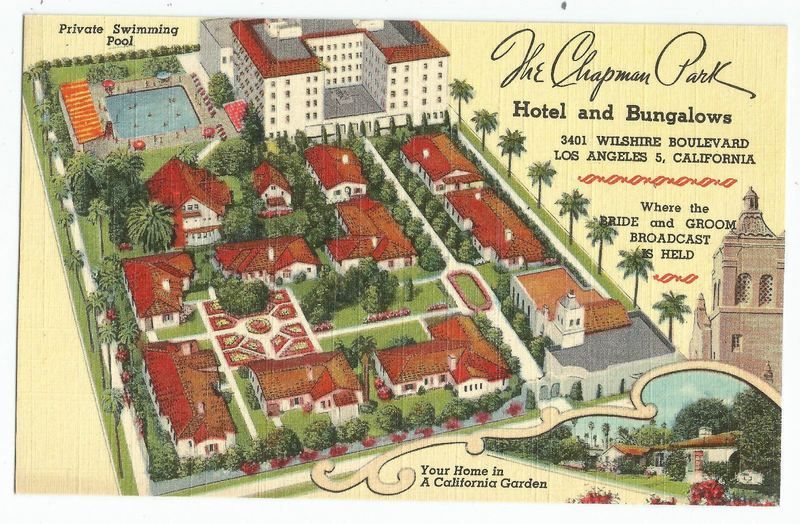
The female athletes competing in the 1932 Summer Olympics stayed in style at the Chapman Park Hotel as shown in this postcard. Photograph in public domain.
The idea, and perhaps rough draft, of an Olympic Village came about during the 1924 Summer Olympics in Paris, France, where Olympic organizers built cabins near the Stade Olympique de Colombes to allow the athletes to easily access the Games' venues.
The 1932 Summer Olympics Brought Shorter Games
Before the 1932 Summer Olympics most summer games were around 80 days. By the time the Summer Olympics came to L.A. the days of the games were cut down to 16 days of events. Since then all Summer Olympics have been between 15-to-18 days.
The Victory Podium Was Used For The First Time In L.A.
In what is one of the most iconic sites of every Olympics is the use of the victory podium awarding the gold, silver and bronze metals. This was first introduced during the 1932 Games in L.A.
The 1932 Olympics Is The Reason L.A. Does Not Have a Tenth Street
Sounds strange, but it is true. When L.A. was selected to host what would be the Games of the X Olympiad, or, the Tenth Modern Olympics, (or rather, being the only one in the class of nations around the world to raise her hands and volunteer to host the games) to honor the occasion the L.A. City Council voted to change the name of Tenth Street to Olympic Boulevard (see what the L.A. City Council they there).
What some people may not know is that Olympic Blvd. is longer than the more famous Wilshire Blvd. as it stretches from Santa Monica all the way across the city to East Los Angeles and into Montebello.
By the way, here is an interesting side-note: Olympic Blvd. was once a highway of sorts, California State Route 26.
The Grand Olympic Auditorium In Downtown L.A. Was Built For The 1932 Olympics
Even though there was very little, well, no competition for winning the bid to host the 1932 Olympics the L.A. Olympic committee officials still needed some places and things to impress The IOC. One of those places was the building of The Grand Olympic Auditorium in 1924. When it opened in 1925 it was the largest indoor venue in the U.S. seating over 15,000 people. During the 1932 Games competitions of boxing, wrestling and weightlifting events were held at The Olympic Auditorium.

The official program of the 1932 Summer Olympics. Photograph in public domain.
What does this mean? Well, even though there has been no official announcement, yet, L.A. is tip-toeing its way back to bidding on hosting the 2024 Summer Olympics. Of course, at this point in the Olympic bidding game, L.A. still has a very long way to go as they have to compete with not just other cities around the United States, but around the world to win hosting the Summer Olympics.
If L.A. is successful in winning the 2024 games The City of Angels would be the only place in the United States to hold three modern Olympic events.
Before we look forward let us look back to the past to one Summer Olympic event. No, not the 1984 Summer Olympics, which, by the way, is often credited for "saving" the modern Olympics by way of over-the-top opening ceremony pageantry and major corporate sponsorship, but the very first Summer Olympics in 1932, officially known as the Games of the X Olympiad, which opened July 30, 1932.

Opening ceremony of the 1932 Summer Olympics at L.A. Memorial Coliseum. Photograph in public domain.
How Did L.A. Win the Bid For The 1932 Summer Olympics?
As you may know by now these days a city in the world bidding to host the Olympics, be it the summer or winter event, is a major competitive event in and of itself with a lot of wooing and impressing International Olympic Committee (IOC) officials.

A parasol for those needing some shade from the summer sun while watching the Summer Olympics. Unclear if this is an official Olympic sanctioned item.
Now to bid for the 1932 summer games L.A. did not have a lot of competition in the bidding process to host the Tenth Modern Olympiad. By not having a lot of competition that is to say L.A. had no competition in bidding to host the games, because L.A. was the only city to bid to host the games.
Why Was L.A. The Only City To Bid On Hosting The 1932 Summer Olympics?
Well, then, as it is now, the decision on where to host the Olympics was made many years in advance. The selection was made at the 23rd IOC Session in Rome, Italy, in 1923, and that decision came on the heels of "the wars to end all wars." Many countries were broke and just weary. So, basically, what was Europe's disadvantage in dealing with the depressing aftermath of World War I was L.A.'s advantage.
The Great Depression Put A Damper On The Olympics

The official 1932 Summer Olympics' logo. Used under public domain.
While the 1920s were a "Roaring" time by the end of that jazz decade the stock market crash of 1929 ushered in the Great Depression. The depression was so bad that many nations and athletes just simply could not afford the trip to L.A. to compete in the 1932 Olympics. In fact, participation in the 1932 games was the lowest since the 1904 Olympics, with only half as many athletes taking part as had in the 1928 Olympics.
Adding To The L.A. Olympics' Woes Was California's Remoteness
Atop of the many problems The Great Depression brought on what further compounded problems with the 1932 Summer Olympics was the difficulty of reaching Southern California. Hard to even imagine today of such a thing, but California was still a remote, somewhat isolated area of the world. Remember, in 1932 the main mode of transportation was passenger railway, which could take several days, and airline travel was still a very exotic thing. Driving your car or taking a bus cross-country could be a harrowing experience.
The President Did Not Even Attend The Opening Ceremony, Or Any Olympic Event
With the many problems plaguing the U.S. and world President Herbert Hoover did not attend the opening ceremony or any Olympic event in L.A. Yes, Mr. Hoover, by this point not a very popular president, skipped this major event held in his country.
Mr. Hoover would be the second U.S. president to miss the Olympics in the United States held during his term behind President Theodore Roosevelt. Mr. Roosevelt refused to attend the 1904 Summer Olympics held in St. Louis, because St. Louis Mayor David R. Francis declined to let Mr. Roosevelt help officiate the games.
Despite Adverse Conditions The Opening Ceremony Broke Records And Set The Standard For Today's Olympic Opening Ceremonies
With The Great Depression, the President of the United States opting not to attend the games and the problems of just simply getting to Southern California you would think these Olympic games would make the record books for being poorly attended and a general lack of caring for the summer games. Glad to report, you would be wrong.

Rare color photograph of the opening ceremony of the 1932 Summer Olympics at L.A. Memorial Coliseum. Photograph in public domain.
Turns out over 100,000 people attended the opening ceremony at the Memorial Coliseum, and, according to the Olympic Movement, "Its scale and quality were beyond anything that had come before, creating the first Games we would recognize today."
Furthermore, the 1932 Summer Olympics, according to Olympic officials, "gave birth to the modern format."
The 1932 Summer Games Gave Birth To The Modern Olympic Village

Rare photograph of the first Olympic Village in Baldwin Hills. Photograph in public domain.
Before the 1932 Summer Olympics athletes, their athletic trainers and other Olympic officials basically had to stay at whatever hotel or other housing they could find, and for Olympic officials that ended up being very expensive. That changed in 1932 with the building of the first modern Olympic Village in Baldwin Hills. Now the males stayed in Baldwin Hills while the female athletes were housed at the Chapman Park Hotel on Wilshire Boulevard.

The female athletes competing in the 1932 Summer Olympics stayed in style at the Chapman Park Hotel as shown in this postcard. Photograph in public domain.
The idea, and perhaps rough draft, of an Olympic Village came about during the 1924 Summer Olympics in Paris, France, where Olympic organizers built cabins near the Stade Olympique de Colombes to allow the athletes to easily access the Games' venues.
The 1932 Summer Olympics Brought Shorter Games
Before the 1932 Summer Olympics most summer games were around 80 days. By the time the Summer Olympics came to L.A. the days of the games were cut down to 16 days of events. Since then all Summer Olympics have been between 15-to-18 days.
The Victory Podium Was Used For The First Time In L.A.
In what is one of the most iconic sites of every Olympics is the use of the victory podium awarding the gold, silver and bronze metals. This was first introduced during the 1932 Games in L.A.
The 1932 Olympics Is The Reason L.A. Does Not Have a Tenth Street
Sounds strange, but it is true. When L.A. was selected to host what would be the Games of the X Olympiad, or, the Tenth Modern Olympics, (or rather, being the only one in the class of nations around the world to raise her hands and volunteer to host the games) to honor the occasion the L.A. City Council voted to change the name of Tenth Street to Olympic Boulevard (see what the L.A. City Council they there).
What some people may not know is that Olympic Blvd. is longer than the more famous Wilshire Blvd. as it stretches from Santa Monica all the way across the city to East Los Angeles and into Montebello.
By the way, here is an interesting side-note: Olympic Blvd. was once a highway of sorts, California State Route 26.
The Grand Olympic Auditorium In Downtown L.A. Was Built For The 1932 Olympics
Even though there was very little, well, no competition for winning the bid to host the 1932 Olympics the L.A. Olympic committee officials still needed some places and things to impress The IOC. One of those places was the building of The Grand Olympic Auditorium in 1924. When it opened in 1925 it was the largest indoor venue in the U.S. seating over 15,000 people. During the 1932 Games competitions of boxing, wrestling and weightlifting events were held at The Olympic Auditorium.
I disagree with the author of this article in his claim that Los Angeles was "remote" in 1932. He is correct in pointing out that the main transportation service in the 1930s was rail - and rail service was at its peak during this era - in terms of service. Rail service helped make Los Angeles closer to the rest of the country. With this in mind - a glance at railroad timetables in 1932 shows an abundance of rail options from all directions (well.....not from the west of course.....) - the Santa Fe, Southern Pacific and Union Pacific railroads all offered many trains to and from Los Angeles. Also the port of Los Angeles offered ocean liner service by several different lines. The photo below shows teams arriving the Santa Fe Railway station on Second and Santa Fe Ave in Los Angeles July 1932 (remember this was before Union Station was built - and in 1932 there were two principal RR stations in Los Angeles - the Santa Fe Station - aka La Grande Station - and the Central Station in which the Southern Pacific and the Union Pacific shared). Just because Los Angeles did not have the mess we know today as LAX or the smoggy tangle of freeways in 1932 - does not make the city of angels "remote." In fact I would argue in many ways it was more accessible then - than now; just think about cruising down 405 today at the lightning speed of 8 mph at rush hour.......progress? In many ways Los Angeles in those pre -smog and pre - freeway days - was at its peak - ironically - during the great depression (one example: 1100 miles of electric rail service (the Pacific Electric railroad and the "yellow cars" of the Los Angeles Railway enabling commuters the freedom of not having to own a car!)
ReplyDeleteKét sắt,
ReplyDeleteđá hoa cương cao cấp,
đá ốp lát,
đá granite,
Quần áo bảo hộ lao động,
Giầy bảo hộ lao động ,
Mũ bảo hộ lao động,
Kính bảo hộ lao động,
Áo phản quang,
Áo phông đồng phục,
Do you need a loan to pay off your bill or in need of financial help with a loan you can contact us now for a loan if you are serious in getting it surely we will help you out via Email {urgentloan22@gmail.com}
ReplyDeleteBORROWERS APPLICATION DETAILS
1. Name Of Applicant in Full:……..
2. Telephone Numbers:……….
3. Address and Location:…….
4. Amount in request………..
5. Repayment Period:………..
6. Purpose Of Loan………….
7. country…………………
8. phone…………………..
9. occupation………………
10.age/sex…………………
11.Monthly Income…………..
12.Email……………..
Regards.
Managements
Email Kindly Contact: urgentloan22@gmail.com
Nice information and great article you post…Share more helpful articles like this…
ReplyDeleteHolmby Hills Residents
Buy Home in Beverly Hills